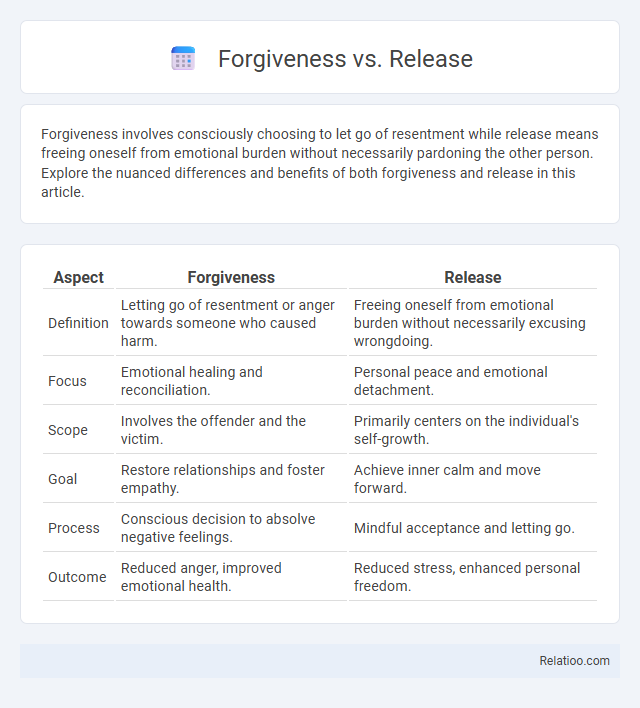Forgiveness involves consciously choosing to let go of resentment while release means freeing oneself from emotional burden without necessarily pardoning the other person. Explore the nuanced differences and benefits of both forgiveness and release in this article.
Table of Comparison
| Aspect | Forgiveness | Release |
|---|---|---|
| Definition | Letting go of resentment or anger towards someone who caused harm. | Freeing oneself from emotional burden without necessarily excusing wrongdoing. |
| Focus | Emotional healing and reconciliation. | Personal peace and emotional detachment. |
| Scope | Involves the offender and the victim. | Primarily centers on the individual's self-growth. |
| Goal | Restore relationships and foster empathy. | Achieve inner calm and move forward. |
| Process | Conscious decision to absolve negative feelings. | Mindful acceptance and letting go. |
| Outcome | Reduced anger, improved emotional health. | Reduced stress, enhanced personal freedom. |
Understanding Forgiveness: Definition and Scope
Forgiveness involves consciously choosing to let go of resentment and thoughts of revenge toward someone who has caused harm, promoting emotional healing and wellbeing. It encompasses acknowledging the offense, processing emotions, and fostering empathy, which can lead to improved mental health and relationships. Understanding its scope reveals that forgiveness is an internal process distinct from releasing, which often implies detaching from negative feelings without necessarily resolving them.
What Does Release Mean in Emotional Healing?
Release in emotional healing means letting go of negative emotions and past traumas that weigh down your mental well-being. Unlike forgiveness, which often involves pardoning someone else's actions, release focuses on freeing your own emotional burdens without necessarily excusing the cause. This internal process promotes healing by reducing stress and allowing your mind to move forward unencumbered by resentment or pain.
Forgiveness vs Release: Key Differences
Forgiveness involves consciously choosing to let go of resentment toward someone who has wronged you, often fostering emotional healing and peace. Release refers to the act of freeing yourself from negative emotions or burdens, which can occur without the need to forgive the other person. Your understanding of these key differences can improve emotional well-being by clarifying whether you seek internal relief or reconciliation with others.
Psychological Benefits of Forgiveness
Forgiveness promotes psychological well-being by reducing stress, anxiety, and depression, allowing Your mind to heal from emotional wounds. It fosters empathy and compassion, which improve emotional resilience and strengthen relationships. Releasing anger and resentment through forgiveness creates a foundation for long-term mental health and inner peace.
The Power of Release in Letting Go
The power of release lies in its ability to free the mind from the grip of negative emotions, fostering emotional clarity and inner peace. Unlike forgiveness, which often requires reconciling with others, release focuses on detaching from pain and resentment for personal healing. Embracing release promotes mental well-being by allowing individuals to move forward without carrying the burdens of past trauma or grudges.
Common Misconceptions About Forgiveness and Release
Common misconceptions about forgiveness often confuse it with releasing all emotional ties, but forgiveness primarily involves letting go of resentment without necessarily erasing the memory of the hurt. Release, on the other hand, emphasizes freeing oneself from ongoing emotional pain or attachment, which can occur independently of forgiveness. Understanding the distinction clarifies that forgiveness is a personal emotional decision, while release focuses on healing and moving forward without necessarily reconciling feelings toward the offender.
Steps to Practice True Forgiveness
True forgiveness involves recognizing your pain, acknowledging the hurt caused by others, and making a conscious decision to let go of resentment. Steps to practice true forgiveness include identifying your emotions, expressing them in a safe space, and reframing the experience to find empathy or understanding. Release follows forgiveness by freeing yourself from the emotional burden, allowing your heart to heal and restoring inner peace.
Techniques for Effective Emotional Release
Techniques for effective emotional release involve understanding the differences between forgiveness, release, and letting go, each serving unique roles in healing. Forgiveness focuses on compassion and emotional reconciliation, while release emphasizes consciously freeing yourself from negative emotions and attachments. Your success in emotional healing depends on practicing mindfulness, journaling, and breathwork to facilitate a powerful and lasting release.
When to Forgive and When to Release
Forgiveness involves consciously choosing to let go of resentment and anger toward someone who has wronged you, often benefiting your emotional healing. Release, on the other hand, refers to the act of detaching from negative emotions or past events without necessarily forgiving the person involved. You should forgive when seeking inner peace and emotional restoration, while release is appropriate when you need to move forward without reconciling or reopening emotional wounds.
Integrating Forgiveness and Release for Inner Peace
Integrating forgiveness and release is essential for achieving profound inner peace by addressing emotional burdens and fostering healing. Forgiveness involves consciously letting go of resentment toward others or oneself, while release pertains to freeing stored negative energy and attachment to past pain. Combining both practices helps clear mental and emotional blockages, promoting resilience, emotional balance, and overall well-being.

Infographic: Forgiveness vs Release
 relatioo.com
relatioo.com